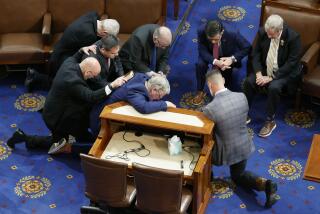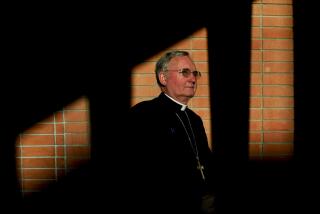Charismatics Flow Into Mainstream : Religion: The movement, which involves ‘speaking in tongues,’ surfaced in Van Nuys 32 years ago and has spread rapidly.
- Share via
On an April Sunday 32 years ago in Van Nuys, an Episcopal priest hoped to tell worshipers at three services as tactfully as possible that he and 70 parishioners were “speaking in tongues,” a most un-Episcopalian practice that smacked of Southern faith healers and poor Pentecostalists.
The Rev. Dennis Bennett got through the 7 a.m. service at St. Mark’s Episcopal Church, but during the second service an assistant priest pulled off his vestments, threw them on the altar and stalked out of the church, saying, “I can no longer work with this man!”
In the ensuing tumult, Bennett announced at the 11 a.m. service that he was resigning as rector, and substitute priests handled the Easter services the next week. Bennett packed himself off to Seattle and tongues-speaking members unwilling to obey a parish-imposed silence left St. Mark’s.
Despite that early reverse, church historians say that the outburst in Van Nuys marked the point where the charismatic renewal, a modified version of Pentecostalist Christianity, first surfaced in mainstream churches and began its rapid spread.
The world’s charismatics numbered about 140 million by 1990, according to widely accepted estimates that also project that charismatics and Pentecostalists will make up 28% of the global churchgoing Christian population by the year 2000.
The combined movements have spread fastest abroad. The Times Poll in December found that only 15% of adults in the San Fernando Valley identified themselves as Pentecostalists or charismatic believers.
Their distinguishing belief is in “gifts of the Holy Spirit,” often signaled by the ability to utter a “language” unknown to the speaker. Critics claim the phenomenon is plain gibberish, but advocates say it is the recovery of a divine gift described in the New Testament. After bitter controversies in the 1960s and early ‘70s, Episcopal, Lutheran, Presbyterian, Roman Catholic and other mainline leaders gradually reached accommodations with charismatics in their ranks.
One ironic sign that a mellowed charismatic movement has blended into mainstream religion today is that the current rector of St. Mark’s Episcopal Church in Van Nuys is a charismatic--a fact hardly known outside the parish and barely noticed within the church.
“I don’t make a big play of it, but it’s not necessary to hide it either,” said the Rev. Gary Dean Hand, 49, who has been rector for 3 1/2 years. “People would hardly ever hear me speaking in tongues because I do it quietly as prayer language.”
The priest said he had conducted classes for 10 months on “gifts of the Holy Spirit,” exploring charismatic approaches. Small charismatic “praise” services are held one Sunday night a month.
Hand estimated that perhaps 10% of the 500-member congregation are charismatics “although they may not use the same words” to describe their beliefs.
When parish leaders first interviewed Hand for the vacant position at St. Mark’s, he was quickly asked, “What do you think about speaking in tongues?” Hand, then serving a Rialto parish, candidly admitted that he did it himself.
Donald Gwaltney, who headed the parish’s governing vestry at that time, recalled that Hand said he was not active in the movement and would not ask people to become charismatics.
“He’s been very well accepted by the parish,” Gwaltney said. But Gwaltney disagreed with the priest’s estimate of charismatic members, saying they probably number only 2% or 3% of the congregation.
The New Testament’s Book of Acts describes the Spirit of God descending on the early apostles in Jerusalem during the festival of Pentecost, prompting them to speak in languages that strangers from other lands recognized as their own tongues.
The Apostle Paul, in letters that became part of the New Testament, admonished church members to curtail ostentatious display of speaking in tongues. He advised limiting the practice to occasions when someone was present to give a Spirit-provided “interpretation” in a language understood by everyone present.
Indeed, Pentecostalist churches that originated early in this century and the neo-Pentecostalist churches under the charismatic label tend to stress that speaking in tongues should be limited to the appropriate settings and not used in a way to suggest that non-charismatics are second-class Christians.
Some conservative denominations, such as the Southern Baptist Convention and the Lutheran Church-Missouri Synod, still bar charismatic practices as divisive in congregations and not the same as the phenomena described in the Bible.
A prominent critic of charismatics, the Rev. John MacArthur of Grace Community Church in Sun Valley, asserted that the movement encourages innumerable bogus claims and false prophets. Charismatic believers tend to rely on experience over Bible teachings, he contends.
In “Charismatic Chaos,” a book published this year, MacArthur wrote that the claim that the charismatics speak in foreign languages unknown to them does not have scientific support. MacArthur suggested that the phenomenon, reported to occur also in non-Christian cultures, may be either demonic in origin or simply learned behavior simulating language.
Most charismatics, in defense, cite anecdotes in which foreigners recognize charismatics’ utterances as their own language.
Some describe them as the work of the Holy Spirit freeing up an inner voice in which they can say to God what they are otherwise unable to articulate. As such, the “gift” introduces the believer to a new world of supernatural possibilities, including healings and spiritual wisdom, according to leaders in the movement.
Two women parishioners who remember the 1960 furor over Bennett’s announcement said recently that it was well after Hand became rector that they learned he was a charismatic. Despite differing perspectives on tongues-speaking, both women thought it was a minor aspect of the priest’s ministry.
“The Lord is the center of his life, and it doesn’t matter whether he speaks in tongues or not. However, it’s nice that he does,” said Helene Culbertson, 72, who began speaking in tongues before Bennett’s fateful announcement but kept quiet about it in order to remain in the parish.
Likewise, Peg Owen, 70, a non-charismatic member who thought Bennett tried to force the practice on them, said that she has not seen any parishioner speaking in tongues since Hand became rector.
“Just once he mentioned that he privately speaks in tongues,” she said. “He doesn’t appear to be charismatic at all.”
Indeed, by appearances, St. Mark’s has a diverse, socially conscious program typical of many churches, including a preschool for low-income families and meeting space for the handicapped and Alcoholics Anonymous. Filipino and Ugandan congregations also meet at the church.
Within the Los Angeles Episcopal Diocese, Hand is known for his busy role as chairman of ecumenical, or interchurch, relations.
There are thousands of openly charismatic clergy and lay people in the diocese, but not all Episcopalians who claim such gifts are officially “out of the closet” on an issue that remains somewhat touchy in their church.
Even though Hand does not conceal his stand, some fellow clergymen do not know him principally in the charismatic role. The Rev. Michael Flynn of St. Jude’s Episcopal Church in Burbank--one of three predominantly charismatic parishes in the diocese--recently said that he “understood” that Hand was a charismatic but that Hand himself would have to confirm that.
In an interview, Hand frankly discussed his experiences and a meeting with Bennett seven years ago.
Hand said that he went to a national conference on charismatic renewal in 1985, hoping to renew his spiritual life. During the meeting, he and a priest colleague confided to each other that they had started speaking in tongues in their prayers.
One of the conference speakers was Bennett, who had become a national figure in the charismatic movement after revitalizing a dying parish near Seattle, and who met with them after his speech.
Bennett died Nov. 1 at age 74. If Bennett could advise him today, “Dennis would probably get on my case” because of his low-key approach to charismatic practices and beliefs, Hand said, “and say, ‘You need to do more.’ ”
Hand indicated, however, that the parish’s past divisions were too much in need of healing to push charismatic practices on reluctant parishioners.
St. Mark’s membership has dropped from a high of 2,500 in 1960 to about 500. The parish schism took an early toll, but most of the reduction parallels changes since the mid-1960s in churchgoing habits and residential patterns in most mainline churches.
Hand said that membership has stabilized and that attendance has nearly doubled since he arrived.
“I’m extremely grateful for what Bennett did,” Hand said. “I think the power of the Spirit that he had is still present.”
More to Read
Sign up for Essential California
The most important California stories and recommendations in your inbox every morning.
You may occasionally receive promotional content from the Los Angeles Times.













